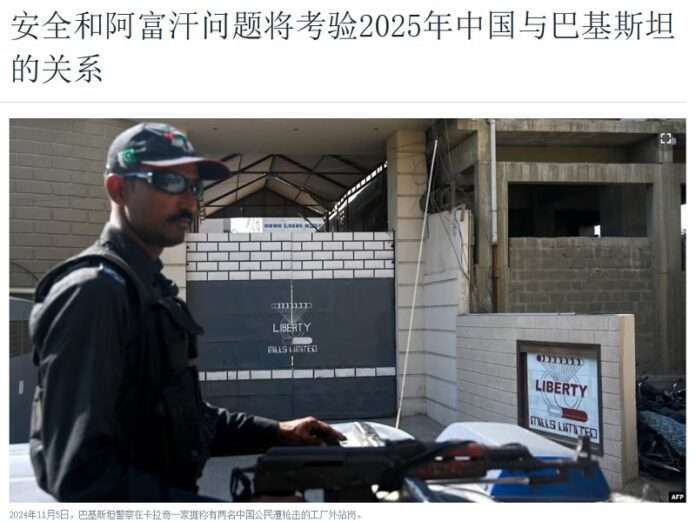Here’s the full interview that I gave to VOA China’s FM Shakil on this subject, excerpts of which were published in their report on 20 January titled “安全和阿富汗问题将考验2025年中国与巴基斯坦的关系”
Sino-Pak ties officially remain excellent, but they appear to have been placed under a lot of strain over the past year. Pakistan’s inability to protect Chinese workers reflects poorly on its role in hosting the Belt & Road Initiative’s (BRI) flagship project, the China-Pakistan Economic Corridor (CPEC).
Where CPEC goes, so goes BRI, or so the perception is among some who consider this megaproject to be a bellwether of this global infrastructure network’s success. It’s little wonder then that China is concerned about its long-term viability.
The latest terrorist attacks in Pakistan are thought to be connected to Afghanistan due to reports that the “Tehrik-i-Taliban Pakistan” (TTP) and “Balochistan Liberation Army” (BLA) are operating out of that country with the tacit approval of the Afghan Taliban (simply the “Taliban”).
Some believe that the Taliban is using terrorist-designated groups as a means of asymmetrically compensating for their conventional military weakness vis-a-vis their former Pakistani patron with whom they’re feuding over the Durand Line, the British-imposed border between Afghanistan and what later became Pakistan, which the Taliban doesn’t recognize.
Regardless of their possible motivation in speculatively resorting to such means to balance Pakistan’s power, the fact of the matter is that these groups are creating a dangerous environment for CPEC, especially the BLA, which sometimes directly targets associated projects and Chinese workers.
The problem from China’s perspective is therefore two-fold: the Taliban is allegedly employing terrorist proxies against Pakistan, which is already troubling enough, but Pakistan is unable to adequately protect CPEC projects and Chinese workers, which is arguably due to its misplaced priority of cracking down on former Prime Minister Imran Khan’s PTI opposition party.
Both of these are outside of China’s direct ability to influence as has been seen. Its prior diplomacy in these regards hasn’t succeeded in getting Afghanistan to eschew such scandalous means for balancing Pakistan’s power, Pakistan continues prioritizing its crackdown on the opposition over its anti-terrorist interests, and ties between these neighboring Chinese-friendly countries continue to deteriorate as proven by the latest tit-for-tat border violence.
If Afghan-Pak relations keep worsening, then China might consider informally curtailing investment into CPEC and possibly even freezing existing projects, including on unrelated pretexts if that happens and its representatives are pressed to publicly account for this in order to avoid the perception that it’s pulling back from BRI’s flagship project.
To add a twist to everything, Donald Trump’s return to the American Presidency might see him possibly provide some form of assistance to Pakistan’s latest anti-terrorist campaign, but on the condition that it pulls back from CPEC (also even if only informally) and provides the US with privileged investment and other opportunities to balance Chinese influence in the country.
His first term was characterized by his economic-driven transactional style so the precedent exists, though he might not ultimately propose such a deal, or it could also include the unacceptable condition of Pakistan curtailing its long-range ballistic missile program against which the former Biden Administration just imposed sanctions, including unprecedented ones against a state agency.
In any case, 2025 might be a difficult year for Sino-Pak relations due to Pakistan’s worsening domestic security situation caused by Afghan-based terrorists (especially the BLA) and Trump’s plans to more muscularly contain China, the latter of which could see him trying to apply more pressure on CPEC in order to discredit BRI as a whole (if the aforesaid upsurge in terrorism doesn’t do so first).
Excerpts from this interview were published in VOA China’s report on 20 January titled “安全和阿富汗问题将考验2025年中国与巴基斯坦的关系”







